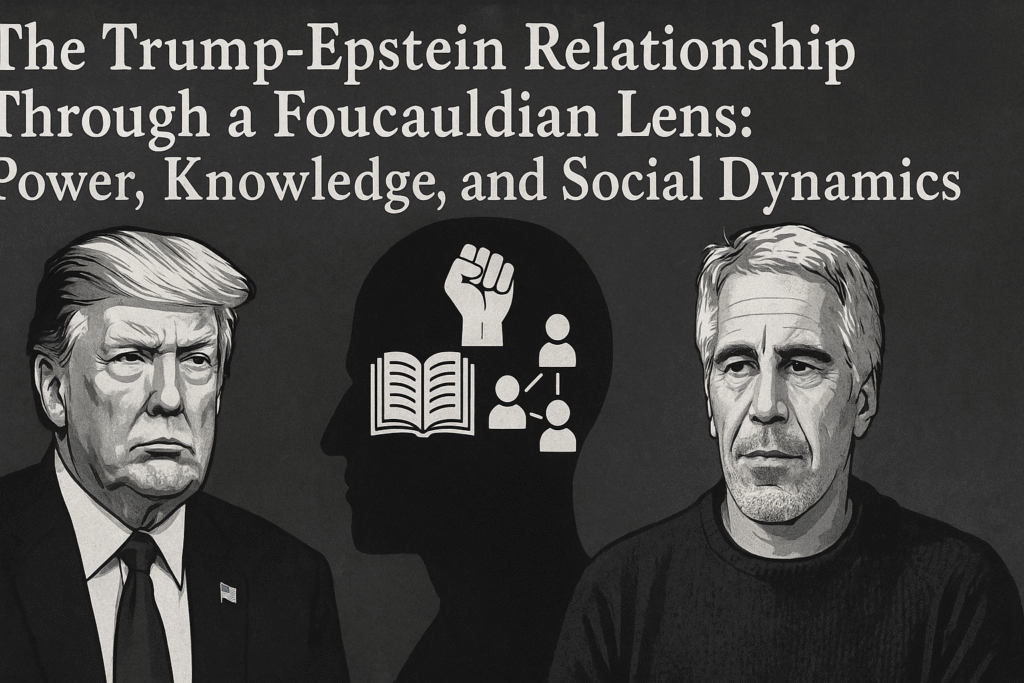The relationship between Donald Trump and Jeffrey Epstein, two prominent figures in elite social circles during the late 1980s and 1990s, has been a subject of intense scrutiny, particularly in light of Epstein’s criminal activities and the subsequent public and media attention.
By applying Michel Foucault’s concepts of power, knowledge, and discourse, this article examines their association, its fallout, and the broader implications for understanding elite networks and their representation in public narratives.
This analysis draws on documented interactions between Trump and Epstein, their social context, and the power dynamics that shaped their relationship and its public perception.
Power and Social Networks
Foucault’s concept of power as a relational and productive force, rather than a top-down imposition, is crucial to understanding the Trump-Epstein connection.
Both men operated within a shared milieu of wealth and influence in New York and Palm Beach, where power was exercised through social connections, access to exclusive spaces, and mutual affiliations. Their interactions, documented in photos, videos, and flight logs, reveal a network of elite relationships where status and access were currencies of power.
For instance, Epstein’s presence at Trump’s Mar-a-Lago club, as seen in 1992 NBC footage, and their joint appearances at events like a 1997 Mar-a-Lago party, illustrate a social economy where both men leveraged each other’s prominence to enhance their standing.
Foucault argues that power operates through networks of relations, not merely possession. In this context, Trump and Epstein were not equals but participants in a reciprocal exchange.
Trump, a real estate magnate and media personality, provided Epstein access to Mar-a-Lago’s elite social scene, while Epstein, a financier with mysterious wealth, offered connections to other high-profile figures, including Britain’s Prince Andrew and Bill Clinton.
This dynamic aligns with Foucault’s view that power is exercised through alliances and dependencies, creating a web of mutual benefit until a rupture—such as their 2004 fallout over a Palm Beach property deal—disrupted this balance.

Knowledge and the Construction of Narratives
Foucault’s concept of power-knowledge emphasizes how knowledge is produced and controlled to sustain power structures. The public narrative surrounding Trump and Epstein has been shaped by selective disclosures, media framing, and strategic silences.
Trump’s 2002 comment to New York Magazine, calling Epstein a “terrific guy” who liked women “on the younger side,” reflects a moment when Epstein’s reputation as a financier overshadowed his later criminal convictions.
This statement, made before Epstein’s 2008 guilty plea to soliciting prostitution, reveals how knowledge about Epstein’s behavior was either unknown or unspoken within elite circles, allowing their association to persist.
Post-2008, as Epstein’s crimes became public, Trump distanced himself, claiming in 2019 that he was “not a fan” and had not spoken to Epstein in 15 years. This shift illustrates Foucault’s idea of discourse as a tool to manage power relations.
By redefining their relationship, Trump sought to control the narrative, aligning himself with public sentiment against Epstein. However, flight logs showing Trump on Epstein’s plane seven times in the 1990s and Epstein’s claim to Michael Wolff that he was Trump’s “closest friend” for a decade complicate this distancing.
The selective release of Epstein-related documents, such as those unsealed in January 2024, further demonstrates how knowledge is curated to shape public perception, often leaving gaps that fuel speculation.
Discourse and the Epstein Files Controversy
The so-called “Epstein files” have become a focal point for conspiracy theories, particularly among Trump’s supporters, who anticipated explosive revelations about elite networks. Foucault’s notion of discourse as a site of power struggle is evident in the public and political battle over these files.
In 2025, Elon Musk’s claim on X that Trump was named in the files, without evidence, reignited debate, while the Justice Department’s July 2025 memo asserting no “client list” existed aimed to close the narrative.
This clash reflects Foucault’s argument that discourse shapes what is accepted as truth, with competing narratives—Trump as implicated versus Trump as uninvolved—vying for dominance.
Trump’s administration, particularly Attorney General Pam Bondi, faced criticism for promising but failing to deliver new information, highlighting how control over knowledge (or its absence) reinforces power.
Bondi’s claim that files were “on her desk” for review, later clarified as referring to general case documents, underscores the strategic use of ambiguity to manage expectations.
Foucault would argue that such maneuvers maintain power by controlling what is known and what remains obscured, particularly when public trust is at stake.
The Fallout and Elite Accountability
The Trump-Epstein fallout, reportedly triggered by Epstein’s inappropriate behavior toward a Mar-a-Lago member’s teenage daughter and a property dispute, exemplifies Foucault’s idea of power as unstable and contingent.
Trump’s decision to ban Epstein from Mar-a-Lago protected his brand, a key node in his power network, but did not lead to broader accountability.
Foucault’s critique of disciplinary mechanisms suggests that elite networks often self-regulate to preserve their status, as seen in Epstein’s lenient 2008 plea deal, facilitated by then-U.S. Attorney Alex Acosta.
This leniency, contrasted with Epstein’s 2019 suicide and the subsequent focus on his associates like Ghislaine Maxwell, reveals how power protects itself through selective punishment and narrative control.
Trump’s warm words for Maxwell in 2020, despite her charges, further complicate his distancing from Epstein, suggesting a lingering alignment with elite solidarity over public accountability.
Conclusion
Through a Foucauldian lens, the Trump-Epstein relationship reveals the interplay of power, knowledge, and discourse in elite social networks. Their association thrived in a context where wealth and status obscured questionable behavior, only fracturing when personal and public interests diverged.
The ongoing controversy over the Epstein files underscores how knowledge is weaponized to shape narratives, with Trump navigating these dynamics to maintain his political capital.
Foucault’s framework illuminates the complexities of this relationship, highlighting the fragility and resilience of power within elite circles and the public’s struggle to uncover truth amidst controlled disclosures.
